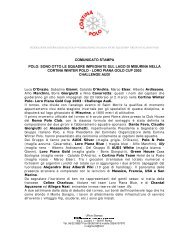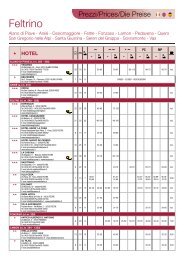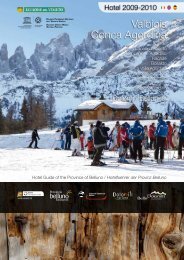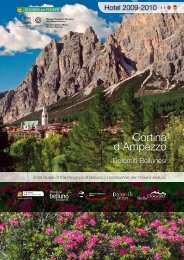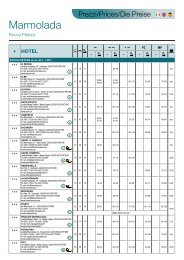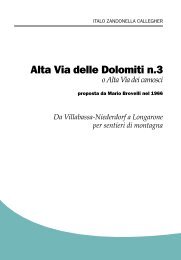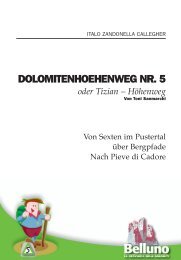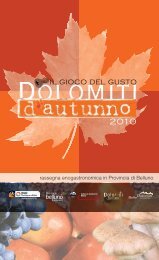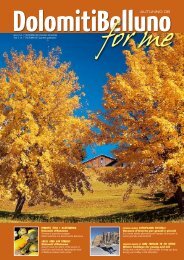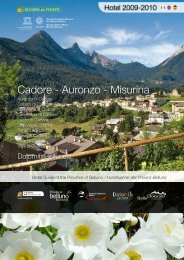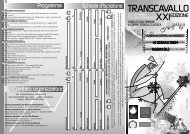Dolomiti Belluno Numero 4 - Dolomiti Turismo
Dolomiti Belluno Numero 4 - Dolomiti Turismo
Dolomiti Belluno Numero 4 - Dolomiti Turismo
You also want an ePaper? Increase the reach of your titles
YUMPU automatically turns print PDFs into web optimized ePapers that Google loves.
dolomiti a tavola<br />
SALUMI BELLUNESI:<br />
una tradizione sempre viva<br />
TYPICAL LOCAL MEAT PRODUCTS: a<br />
surviving tradition in the <strong>Belluno</strong> area<br />
© Agenzia Obiettivo<br />
La tradizione culinaria della Provincia di <strong>Belluno</strong> ha nei salumi uno<br />
dei suoi punti di forza. Il pastin, tipica produzione di queste zone,<br />
è il prodotto più famoso ma salsicce, salami e soppresse da<br />
sempre sono parte integrante della cultura del Bellunese.<br />
Una cultura che in quest’epoca di riscoperta di tutto ciò che è<br />
biologico può giocare una carta in più. In Provincia di <strong>Belluno</strong><br />
sono ancora molti i produttori che lavorano la carne in maniera<br />
tradizionale. Tutta la fi liera produttiva, dall’allevamento alla vendita,<br />
è ancora gelosa custode dei metodi di produzione immutati nel<br />
tempo.<br />
In Valbelluna, ad esempio, non mancano gli esempi di chi lavora<br />
ancora in maniera totalmente artigianale. Un salto a Roe Basse<br />
di Sedico può aiutare a capire meglio ciò di cui stiamo parlando.<br />
Lì da ventotto anni opera Ermen Gretti, producendo salumi di<br />
qualità apprezzatissimi in tutta la zona. La tradizione è custodita<br />
già dall’inizio. La carne utilizzata per produrre gli oltre sei quintali<br />
di salami che ogni settimana vanno a rifornire la macelleria di<br />
proprietà e quelle di altri venditori attenti alla qualità proviene da<br />
allevamenti della zona, nei quali i maiali sono cresciuti ancora<br />
in maniera prettamente tradizionale. Non si parla di tecniche<br />
industriali o di allevamenti intensivi, men che meno viene utilizzata<br />
la parola Ogm: tutto è naturale.<br />
Anche la produzione dei salumi segue le orme della tradizione:<br />
la carne è lavorata a mano in tutte le sue fasi, fi no a raggiungere<br />
(dopo un breve periodo di stagionatura in cantina) i banchi dei<br />
macellai e da lì le tavole delle famiglie attente alla qualità.<br />
È attraverso produttori di questo tipo (ancora numerosi in Provincia<br />
di <strong>Belluno</strong>) che la tradizione culinaria si tramanda e non viene<br />
dimenticata.<br />
One of the keystones of culinary tradition in the province of <strong>Belluno</strong><br />
is made up of the range of typical local meat products. Pastin, the<br />
characteristic local spiced, raw mincemeat, is perhaps the most<br />
famous, but sausages, salami and soppressa (a kind of seasoned<br />
pork salami) have also always been an integral part of <strong>Belluno</strong>’s<br />
food culture; a culture which has very much an ace up its sleeve in<br />
this age of rediscovery of organic, natural cuisine. A large number<br />
of producers in the province of <strong>Belluno</strong> still use traditional methods<br />
to make their meat products, methods which have remained largely<br />
unchanged over the years at every stage of the production process,<br />
from stock raising to product sales. In the Valbelluna area, for<br />
instance, there are still a number of producers who use exclusively<br />
traditional craft methods. To give you an idea of what we mean, you<br />
might like to take a visit to Roe Basse di Sedico, where Ermen Gretti<br />
has been in business for 28 years, making quality salami which is<br />
extremely popular throughout the surrounding area. The importance<br />
of tradition and natural ingredients starts right from the fi rst stage<br />
of the production process; the meat used to make the six quintals<br />
plus of salami sold each week in Gretti’s own butcher’s (and in others<br />
who place the same importance he does on quality) comes from<br />
local farms, on which the pigs are raised in the traditional way: no<br />
industrial techniques, no intensive breeding, no GMOs – everything is<br />
completely natural. The salami is also made in the traditional fashion:<br />
the meat is worked by hand throughout all the production phases,<br />
until – after being matured for a short time in the cellar – it reaches<br />
the butcher’s counter and is sold to the more discerning consumer.<br />
It is products like these (of which there are still numerous examples<br />
in the province) which guarantee that culinary traditions survive down<br />
through the generations and do not risk being forgotten.<br />
40



